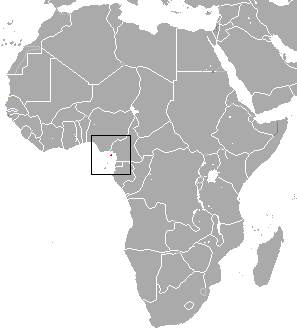Eisentraut's mouse shrew facts for kids
Quick facts for kids Eisentraut's mouse shrew |
|
|---|---|
| Conservation status | |
| Scientific classification | |
| Genus: |
Myosorex
|
| Species: |
eisentrauti
|
 |
|
| Eisentraut's mouse shrew range | |
The Eisentraut's mouse shrew (Myosorex eisentrauti) is a tiny mammal that looks a bit like a mouse. It's a type of shrew, which are small, mouse-like animals with long snouts. This special shrew is found only on Bioko Island, which is part of Equatorial Guinea in Africa.
Sadly, the Eisentraut's mouse shrew is in big trouble. It is listed as a critically endangered species. This means there are very few of them left in the wild. Their main problems are habitat loss and having a very small area where they can live.
Contents
What is a Shrew?
A shrew is a small, furry mammal. They are often mistaken for mice, but they are not rodents. Shrews have long, pointed snouts and tiny eyes. They are very active and have a fast metabolism, which means they need to eat a lot of food. Most shrews eat insects, worms, and other small creatures.
Mouse Shrews
The Eisentraut's mouse shrew belongs to a group called Myosorex. These shrews are known for their mouse-like appearance. They are usually found in forests and other damp places.
Where Does It Live?
The Eisentraut's mouse shrew lives only on Bioko Island. This island is off the coast of West Africa. It's a beautiful place with rainforests and mountains.
Bioko Island Habitat
The shrew's home on Bioko Island is typically in forests. These forests provide the food and shelter they need to survive. The island's unique environment makes it a special place for many animals.
Why is it Endangered?
Being "critically endangered" means a species faces an extremely high risk of becoming extinct in the wild. The Eisentraut's mouse shrew is in this category for two main reasons.
Habitat Loss
One big problem is habitat loss. This happens when the places where animals live are destroyed or changed. For the Eisentraut's mouse shrew, this means their forest homes on Bioko Island are disappearing. Forests might be cut down for farming, building, or other human activities. When their habitat is gone, these shrews have nowhere to live or find food.
Restricted Range
The second reason is its restricted range. This means the shrew only lives in a very small area. If a species lives in only one small place, it's more vulnerable. Any big change to that area, like a disease or more habitat loss, can affect the entire population very quickly.
Conservation Efforts
Protecting critically endangered species like the Eisentraut's mouse shrew is very important. Scientists and conservation groups work to understand these animals better. They also try to protect their habitats.
How We Can Help
Protecting forests and natural areas is key to saving species like this shrew. Learning about these animals and their homes helps people understand why conservation matters. Every effort to protect nature helps these unique creatures survive.
See also
 In Spanish: Myosorex eisentrauti para niños
In Spanish: Myosorex eisentrauti para niños


